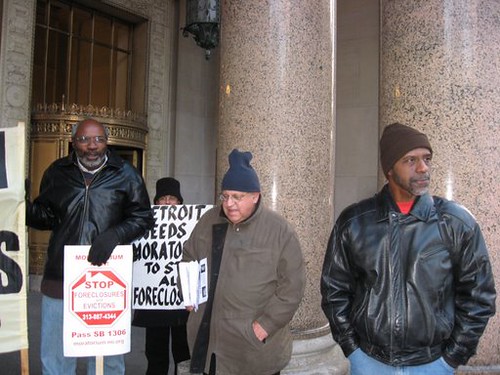
Abayomi Azikiwe, editor of the Pan-African News Wire, covering a Moratorium Now! Coalition demonstration outside the State Office Building, Cadillac Plaza, in the Detroit New Center Area on November 20, 2008. (Photo: Alan Pollock)., a photo by Pan-African News Wire File Photos on Flickr.
How the Banks Destroyed Detroit
Public Meeting on Sat., April 30 From 5:00-8:00pm
Location: 5920 Second Ave. at Antoinette, WSU Campus Area
Sponsors: Workers World Party
For More Info: 313.459.0777
How the banks destroyed Detroit
Published Sun, Apr 10, 2011
By Jerry Goldberg
Worker’s World
Detroit lost 25 percent of its population in the last decade, according to the 2010 U.S. Census (Detroit News, March 23). Detroit’s population declined from 951,270 in 2000 to 713,777 in 2010. Detroit, an 85 percent African American city, experienced the greatest population loss of any U.S. city, except New Orleans.
Not one of the many newspaper articles discussing this lost population puts the blame where it belongs — on the major banks, which have leveled neighborhoods throughout Detroit with mass foreclosures driven by racist, predatory lending.
The foreclosure epidemic that has leveled communities throughout Detroit is a direct product of the racist lending practices of every major bank. The Michigan State Housing Development Authority published data noting 62 percent of all mortgage loans to African Americans in metro Detroit in 2005-2007 were subprime loans, compared to 28 percent for whites. A huge 87 percent of African American borrowers in Wayne County, where the city of Detroit is located, were sold subprime loans in 2006 (Detroit News, Sept. 8, 2007).
A January 2009 report prepared by the city’s Planning and Development Department noted of 330,000 new mortgages in Detroit from 2004 to 2006, 73 percent were subprime mortgages (mortgages at least 3 percent above the standard interest rate).
The report noted from 2005 to 2009, the city experienced 67,000 bank foreclosures, more than 20 percent of all household mortgages. In addition, there were 4,000 tax foreclosures in the first six months of 2008. The study noted two-thirds of foreclosed properties are now vacant.
The foreclosures have continued in the years since this report was published. More than 69,000 homes in the metro Detroit area received delinquency or foreclosure notices in 2009 (foreclosuredeals.com, Feb. 9, 2010).
Metro Detroit recorded 43,541 foreclosures in 2010, the third highest number in the United States (Detroit News, Jan. 27). Last fall, 13,000 tax-foreclosed properties were placed on the auction block (Michigan Public Radio, Sept. 17).
The banks knew these subprime loans would fail when they made them, but they didn’t care because of the massive profits they made — until the bubble burst, at which time the banks were bailed out by the taxpayers and continue to be bailed out to this day. Most mortgage loans are owned or backed by such federal government entities as Fannie Mae, Freddie Mac and the Department of Housing and Urban Development. The federal government pays the bank the inflated value of the mortgage and then evicts the homeowner.
Stop debt service to the banks
Detroit had the lowest foreclosure rate of any metropolitan area in the U.S. in 1996 (Black Commentator, Nov. 22, 2007). An article on Landlord Nation, April 13, 2009, reported that Detroit, a city once known for its high percentage of home ownership for African Americans, now has the lowest ownership rate for single family detached homes out of the 20 largest cities in the United States. The average sale price of homes in Detroit with HUD-backed mortgages plunged from $46,702 in 2003 to $8,672 in 2008 and $6,035 for the first three months of 2009.
As early as March 2007, the Moratorium Now! Coalition to Stop Foreclosures, Evictions and Utility Shutoffs pointed out to Democratic Gov. Jennifer Granholm that she could declare a state of economic emergency under Michigan law and place a moratorium on foreclosures based on the 1930s Mortgage Moratorium Act, which was upheld by the Michigan and U.S. Supreme Courts. Granholm explicitly stated, “The banks wouldn’t like it.”
The coalition similarly approached three Detroit mayors — Kwame Kilpatrick, Kenneth Cockrel Jr. and Dave Bing — to declare a state of emergency in Detroit and formally request the imposition of a foreclosure moratorium for the city. Each of these politicians rejected this demand that would have preserved Detroit’s housing and population base.
Today, with the city’s tax base destroyed by the loss of property values caused by the foreclosure epidemic, the same banks that caused this crisis have the audacity to demand huge cutbacks in city services and jobs in order to be paid debt service on loans made to the city, which are continually renegotiated as the tax base declines.
In fact, the banks exercise direct control over large sections of the city budget, with casino tax dollars and state revenue sharing paid to trustees, so the funds go directly to the banks. Up to 80 percent of state school aid is earmarked for debt service to the banks (Detroit News, April 4, 2010). Detroit can be rebuilt and repopulated.
The city needs a massive jobs program where youth can be trained as carpenters, plumbers and electricians to rebuild the housing stock that has been destroyed by the banks, so that vacant homes can be returned to their rightful owners or turned over to the homeless and unemployed. This jobs program can be paid for by placing a moratorium on debt service to the banks, as well as collecting reparations from the banks for destroying this once great city.
Workers World, 55 W. 17 St., NY, NY 10011. E-mail: ww@workers.org. Subscribe wwnews-subscribe@workersworld.net.
No comments:
Post a Comment